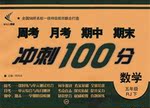题目内容
阅读理解。
You want to know about life in the past. Right? I can tell you. When I was a boy, things were
different. I had to get up at six every morning. That was not very bad in summer, but in winter it was
cold. And we didn't have any hot water in the house. We had to wash in cold water. We didn't have
a bathroom (浴室). My dad had some chickens. I had to feed (喂养) them every morning and then I
had to walk to school with my little sister. It was about two miles (英里) to school and about two
miles back in the evening. But it always seemed longer in the morning when we were going to school.
There was a bus, but we didn't have any money. And we had to go to bed at eleven o'clock every
night because I had too much homework and housework to do. We couldn't watch TV because there
wasn't any. On Sundays we had to go to church (教堂) three times -morning, afternoon and evening.
And we couldn't play outside on Sundays. But it wasn't all bad. We had some good times (时光). We
could go out and our parents didn't have to worry about us. There weren't so many cars on the roads
then, so the streets were safe to play in. And there were not many robbers and thieves in those days.
We had to work hard and we weren't able to buy all those things in the shops today. Life was hard,
but it was simple (单纯的) and people were happier. I don't think I'd like to be young today.
different. I had to get up at six every morning. That was not very bad in summer, but in winter it was
cold. And we didn't have any hot water in the house. We had to wash in cold water. We didn't have
a bathroom (浴室). My dad had some chickens. I had to feed (喂养) them every morning and then I
had to walk to school with my little sister. It was about two miles (英里) to school and about two
miles back in the evening. But it always seemed longer in the morning when we were going to school.
There was a bus, but we didn't have any money. And we had to go to bed at eleven o'clock every
night because I had too much homework and housework to do. We couldn't watch TV because there
wasn't any. On Sundays we had to go to church (教堂) three times -morning, afternoon and evening.
And we couldn't play outside on Sundays. But it wasn't all bad. We had some good times (时光). We
could go out and our parents didn't have to worry about us. There weren't so many cars on the roads
then, so the streets were safe to play in. And there were not many robbers and thieves in those days.
We had to work hard and we weren't able to buy all those things in the shops today. Life was hard,
but it was simple (单纯的) and people were happier. I don't think I'd like to be young today.
1. The writer usually went to bed ______ every night.
A. at six
B. at eight
C. at nine
D. at eleven
B. at eight
C. at nine
D. at eleven
2. The writer walked about ______ every day.
A. two miles
B. three miles
C. four miles
D. five miles
B. three miles
C. four miles
D. five miles
3. Every morning the writer had to feed ______.
A. his little sister
B. his lovely dog
C. his chickens
D. his father's chickens
B. his lovely dog
C. his chickens
D. his father's chickens
4. The writer had a ______ but ______ family.
A. rich; happy
B. poor; happy
C. hard; poor
D. rich; hard
B. poor; happy
C. hard; poor
D. rich; hard
5. Which of the following is NOT TRUE?
A. The writer had a little sister.
B. The writer couldn't take the school bus.
C. The writer and his sister never had any good times.
D. The write had to get up at six.
B. The writer couldn't take the school bus.
C. The writer and his sister never had any good times.
D. The write had to get up at six.
1-5 DADBC

练习册系列答案
 新非凡教辅冲刺100分系列答案
新非凡教辅冲刺100分系列答案
相关题目
| 阅读理解.根据表格内容,选择最佳答案. | ||||||||||||||||||||||||||||||||||||||||||
| ||||||||||||||||||||||||||||||||||||||||||
| 1. On , Paula usually gets up at 7:10 a.m. | ||||||||||||||||||||||||||||||||||||||||||
| A. Thursdays B. Wednesdays C. weekdays D. weekends | ||||||||||||||||||||||||||||||||||||||||||
| 2. Pizza is a kind of' . | ||||||||||||||||||||||||||||||||||||||||||
| A. drink B. fruit C. toy D. food | ||||||||||||||||||||||||||||||||||||||||||
| 3. Paula's favorite sport is _ | ||||||||||||||||||||||||||||||||||||||||||
| A. volleyball B. table tennis C. yo-yo D. soccer | ||||||||||||||||||||||||||||||||||||||||||
| 4. On Wednesday evenings Paula usually _ . | ||||||||||||||||||||||||||||||||||||||||||
| A. watches TV B. does her homework C. washes her clothes D. goes to see her friends | ||||||||||||||||||||||||||||||||||||||||||
| 5. Which of the following is WRONG? | ||||||||||||||||||||||||||||||||||||||||||
| A. Paula goes to school f'rom Monday to Friday. B. Paula goes to bed af'ter ten p. m. C. Paula has sports in the afternoon. D. Paula usually has pizza for lunch. |
 mith. He is sitting on the chair and watching the children. Some
mith. He is sitting on the chair and watching the children. Some  e of hide-and-seek (捉迷藏). Some boys are playing with their yo-yos.
e of hide-and-seek (捉迷藏). Some boys are playing with their yo-yos. 